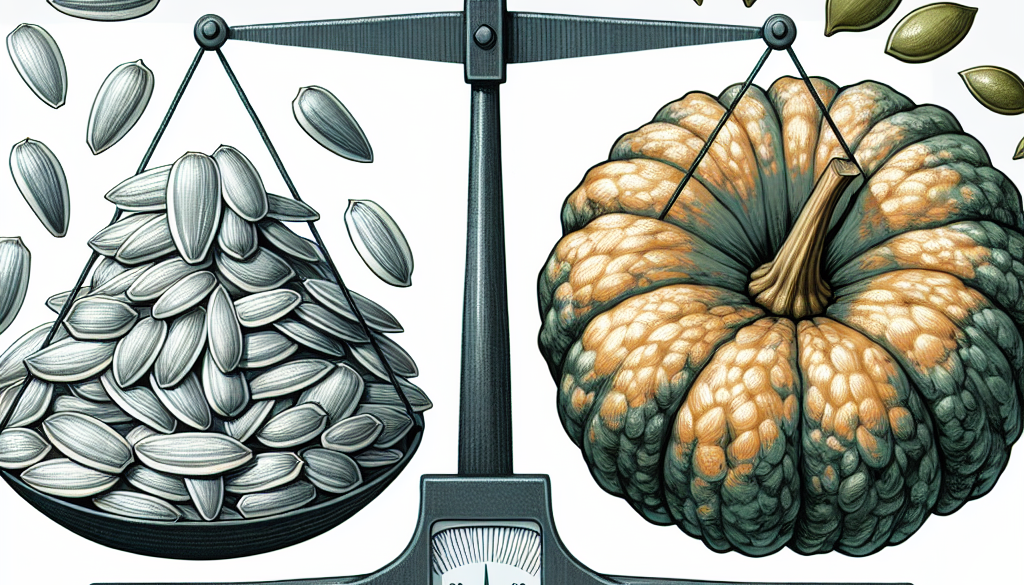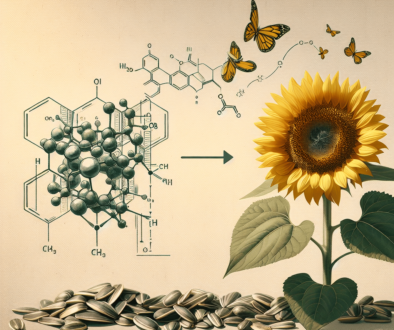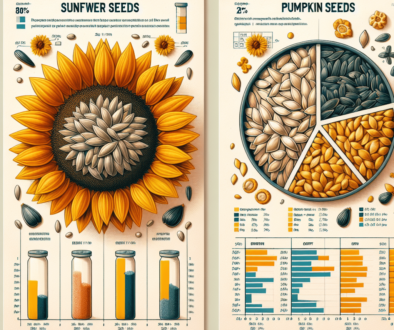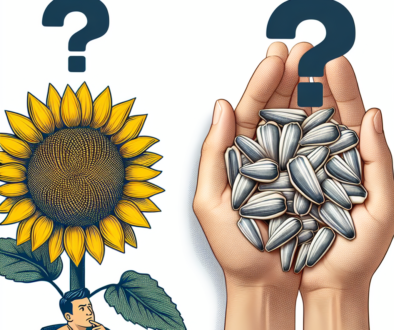What Has More Protein Sunflower Seeds Or Pumpkin Seeds?
-
Table of Contents
- Protein Showdown: Sunflower Seeds vs. Pumpkin Seeds
- Nutritional Overview of Sunflower Seeds
- Nutritional Overview of Pumpkin Seeds
- Comparing Protein Content
- Health Benefits of High-Protein Seeds
- How to Incorporate Seeds into Your Diet
- Conclusion: A Close Protein Race
- Discover ETprotein’s High-Quality Seed Proteins
Protein Showdown: Sunflower Seeds vs. Pumpkin Seeds
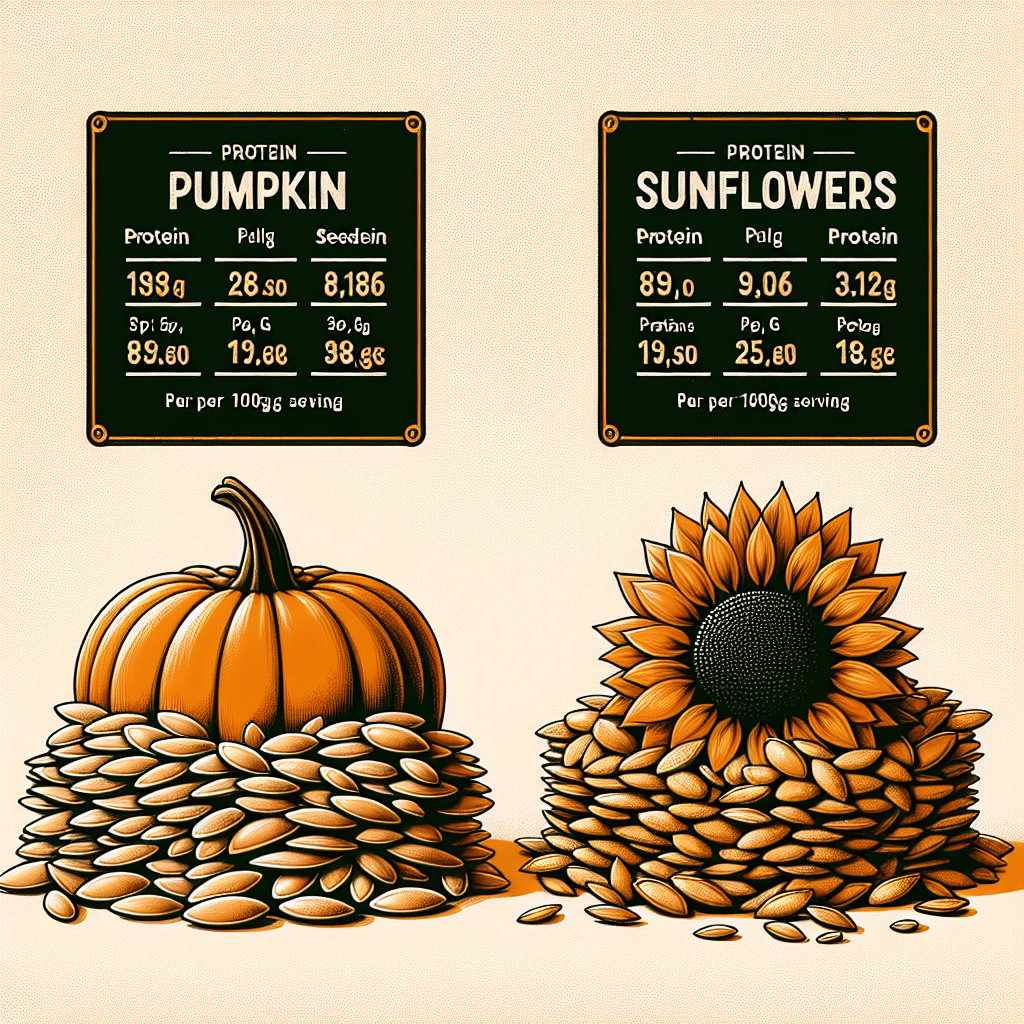
When it comes to snacking, seeds are a powerhouse of nutrition, offering a plethora of health benefits along with a satisfying crunch. Among the most popular are sunflower and pumpkin seeds, both of which are known for their high protein content. But which of these seeds has more protein? This article delves into the nutritional profiles of sunflower and pumpkin seeds to determine which one is the superior source of protein.
Nutritional Overview of Sunflower Seeds
Sunflower seeds, harvested from the large flower heads of the sunflower plant, are a popular snack and a versatile ingredient in many dishes. They are rich in healthy fats, vitamins, minerals, and, importantly, protein. A 100-gram serving of sunflower seeds typically contains:
- Protein: 20-23 grams
- Fat: 47-50 grams (predominantly unsaturated fats)
- Carbohydrates: 20 grams (mostly from fiber)
- Vitamins: High in Vitamin E and B vitamins
- Minerals: Magnesium, phosphorus, selenium, and zinc
These seeds are also a good source of antioxidants, particularly vitamin E, which is known for its role in skin health and immune function.
Nutritional Overview of Pumpkin Seeds
Pumpkin seeds, also known as pepitas, are the edible seeds of a pumpkin or certain other cultivars of squash. They are typically flat and asymmetrically oval, with a green color and a chewy texture. A 100-gram serving of pumpkin seeds contains:
- Protein: 18-30 grams
- Fat: 45-49 grams (mostly unsaturated fats)
- Carbohydrates: 10-15 grams (mostly from fiber)
- Vitamins: Vitamin K, and a good range of B vitamins
- Minerals: Iron, magnesium, phosphorus, zinc, and copper
Pumpkin seeds are also known for their high magnesium content, which is crucial for various bodily functions, including muscle and nerve function, blood sugar control, and blood pressure regulation.
Comparing Protein Content
When comparing the protein content of sunflower and pumpkin seeds, it’s important to consider the serving size and the context in which you’re consuming them. Both seeds have a high protein content, but the exact amount can vary based on the variety and preparation method.
On average, sunflower seeds contain slightly less protein than pumpkin seeds. However, the difference is not substantial, and both seeds can be considered excellent sources of plant-based protein. The protein in these seeds is also accompanied by a rich profile of essential amino acids, which are the building blocks of protein necessary for various bodily functions.
Health Benefits of High-Protein Seeds
Consuming seeds with a high protein content offers numerous health benefits:
- Weight Management: Protein-rich foods like sunflower and pumpkin seeds can help you feel full longer, reducing the likelihood of overeating.
- Muscle Maintenance: Adequate protein intake is essential for the maintenance and repair of muscle tissue, especially important for athletes and those with active lifestyles.
- Bone Health: The minerals found in these seeds, along with their protein content, contribute to strong and healthy bones.
- Heart Health: The unsaturated fats in both sunflower and pumpkin seeds are beneficial for heart health, potentially reducing the risk of heart disease when consumed as part of a balanced diet.
How to Incorporate Seeds into Your Diet
Both sunflower and pumpkin seeds are incredibly versatile and can be easily incorporated into your diet. Here are some suggestions:
- Add them to salads for a crunchy texture and a protein boost.
- Blend them into smoothies or sprinkle them on top of yogurt or oatmeal.
- Use them as a topping for bread, muffins, or pancakes.
- Make homemade seed butter by blending them until smooth.
- Roast them with spices for a savory snack.
Conclusion: A Close Protein Race
In conclusion, both sunflower and pumpkin seeds are excellent sources of protein, with pumpkin seeds generally offering a slightly higher amount. However, the difference is minimal, and both seeds provide a range of other nutrients that contribute to a healthy diet. Whether you choose sunflower or pumpkin seeds, you’ll be making a nutritious choice that supports your overall health.
Discover ETprotein’s High-Quality Seed Proteins
If you’re looking for a convenient way to increase your protein intake with the benefits of sunflower and pumpkin seeds, ETprotein offers a range of high-quality seed protein products. Their organic bulk vegan proteins are perfect for those seeking non-GMO, allergen-free options with a neutral taste.
ETprotein’s pumpkin seed protein and sunflower seed protein are just two of the many plant-based proteins they offer. These products are ideal for various industries, including nutraceuticals, pharmaceuticals, and food and beverage. With a commitment to quality and customer satisfaction, ETprotein is a trusted supplier for your protein needs.
About ETprotein:
ETprotein, a reputable protein and L-(+)-Ergothioneine (EGT) Chinese factory manufacturer and supplier, is renowned for producing, stocking, exporting, and delivering the highest quality organic bulk vegan proteins and L-(+)-Ergothioneine. They include Organic rice protein, clear rice protein, pea protein, clear pea protein, watermelon seed protein, pumpkin seed protein, sunflower seed protein, mung bean protein, peanut protein, and L-(+)-Ergothioneine EGT Pharmaceutical grade, L-(+)-Ergothioneine EGT food grade, L-(+)-Ergothioneine EGT cosmetic grade, L-(+)-Ergothioneine EGT reference grade and L-(+)-Ergothioneine EGT standard. Their offerings, characterized by a neutral taste, non-GMO, allergen-free attributes, with L-(+)-Ergothioneine purity over 98%, 99%, cater to a diverse range of industries. They serve nutraceutical, pharmaceutical, cosmeceutical, veterinary, as well as food and beverage finished product distributors, traders, and manufacturers across Europe, USA, Canada, Australia, Thailand, Japan, Korea, Brazil, and Chile, among others.
ETprotein specialization includes exporting and delivering tailor-made protein powder and finished nutritional supplements. Their extensive product range covers sectors like Food and Beverage, Sports Nutrition, Weight Management, Dietary Supplements, Health and Wellness Products, and Infant Formula, ensuring comprehensive solutions to meet all your protein needs.
As a trusted company by leading global food and beverage brands and Fortune 500 companies, ETprotein reinforces China’s reputation in the global arena. For more information or to sample their products, please contact them and email sales(at)ETprotein.com today.

